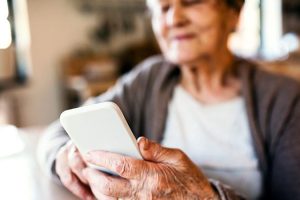Novel Smartphone App Helps Reduce Fear of Cancer Recurrence

A novel “smartphone psychotherapy” application has been shown to relieve some of the anxiety and fear about cancer recurrence (FCR) that often causes distress to cancer survivors.
The intervention is comprised of smartphone problem-solving therapy and behavioral activation apps, and was tested in a study that involved 447 survivors of breast cancer. The results showed that the group of survivors who used the app had statistically greater improvements on a scale measuring fear of cancer recurrence as well as several measures of anxiety and depression at week 8 when compared with controls.
“To our knowledge, the present study is the first to demonstrate the efficacy of smartphone-based psychological therapies in reducing FCR among breast cancer survivors,” the authors comment.
It also “demonstrated that the intervention had potential efficacy on depression and psychological needs among breast cancer survivors,” they write.
“Given the large number of cancer survivors and the limited number of therapists to competently conduct appropriate psychotherapy, novel smartphone psychotherapy may be a promising way to reduce fear of cancer recurrence,” they suggested.
The study was published online November 2 in the Journal of Clinical Oncology.
Commenting on the study, Erica L. Mayer, MD, MPH, director of clinical research at the Dana-Farber Cancer Institute, Boston, Massachusetts, noted that “the use of a novel 8-week cognitive behavioral therapy smartphone app significantly reduced measures of psychological distress, especially in those who expressed anxiety at baseline.”
“These findings suggest expanded use of smartphone-based mental health support is feasible and effective and may be an efficient platform to provide mental health support to young breast cancer survivors,” Mayer said in a statement.
Results From Randomized Trial
The study was led by Tatsuo Akechi , MD, PhD, from the Department of Psychiatry and Cognitive-Behavioral Medicine and Division of Palliative Care and Psycho-oncology, Nagoya City University Hospital, Nagoya, Japan.
They had conducted a previous study in which they showed that the common unmet need reported by ambulatory patients with breast cancer was psychological — and in particular, a fear of cancer recurrence. ( Psycho-oncology 2011; 20:497-505 ). More than half of the participants cited these issues, and it has also been reported in other papers and associated with poor quality of life. In addition, they note that although research supports numerous psychological interventions that help survivors with fear of recurrence, one problem is the low participation rate because of time and distance issues (eg, more than 60% of potentially eligible participants decline participation). Another problem is that the number of therapists who can provide such specialized care may be limited.
So, the team developed a problem-solving therapy (PST) program as a smartphone app. Its acceptability and efficacy was demonstrated in a single-arm pilot study with breast cancer survivors (Jpn J Clin Oncol 2019; 49:537-544).
Building on those results, they now conducted a randomized trial to further examine the efficacy of smartphone-based PST and behavioral activation (BA) interventions in reducing fears of recurrence among breast cancer survivors.
For this trial, they randomly assigned disease-free breast cancer survivors between the ages of 20-49 years to the smartphone-based intervention (n = 223) or waitlist control (n = 224). Both groups received treatment as usual, and the control group could access the smartphone apps during weeks 8-24.
Primary outcome data at 8 weeks were obtained for 444 randomly assigned participants (99.7% of the total 447 participants). Among the 223 participants who received the intervention, 213 (95.5%) completed the follow-up assessment at week 24.
Their results showed that women using the smartphone app experienced a statistically significant improvement in the primary endpoint, the Concerns About Recurrence Scale (CARS-J) scores at week 8 compared to the control group (difference –1.39, P < .001; ES = 0.32).
The intervention group also had a statistically significant improvement at week 8 in the Fear of Cancer Recurrence Inventory-Short Form (FCRI-SF) score (difference –1.65; P < .001; ES = 0.25), the Hospital Anxiety and Depression Scale (HADS) score (difference –0.49; P < .05; ES = 0.19), and the Short-form Supportive Care Needs Survey (SCNS-SF34) psychological domain score (difference –1.49; P < .05; ES = 0.16).
By week 24, these differences between the smartphone group and the control group were no longer significant, except for HADS depression scores, which were significant at 24 weeks compared with 8 weeks (P < .05).
The overall satisfaction with treatment in the intervention and control groups was rated at 73.4 (standard deviation = 17.3) and 73.9 (standard deviation = 17.7), respectively, but it did not reach statistical significance (P = .26).
The study was supported by a Grant-in-Aid for Japan Agency for Medical Research and Development, and partly supported by a Grant-in-Aid for Scientific Research and Young scientists from the Japanese Ministry of Education, Culture, Science, and Technology; a grant from Nagoya City University Foundation for Promotion of Cancer Research in Japan; and The National Cancer Center Research and Development Fund. Several of the co-authors report relationships with industry, as noted in the original article.
J Clin Oncol. Published online November 2, 2022. Full text
Roxanne Nelson is a registered nurse and an award-winning medical writer who has written for many major news outlets and is a regular contributor to Medscape.
For more from Medscape Oncology, join us on Twitter and Facebook
Source: Read Full Article




